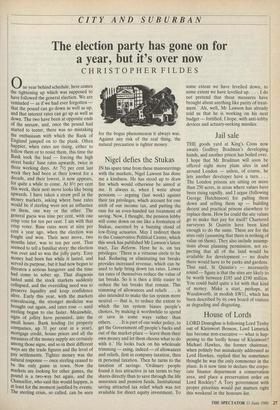CITY AND SUBURBAN
The election party has gone on for a year, but it's over now
CHRISTOPHER FILDES
0 ne year behind schedule, here comes the tightening up which was supposed to have followed the general election. We are reminded — as if we had ever forgotten — that the pound can go down as well as up, and that interest rates can go up as well as down. The two have been at opposite ends of the seesaw, and, once the pound had started to teeter, there was no mistaking the enthusiasm with which the Bank of England jumped on to the plank. Often happier, when rates are rising, either to follow them or to resist them, this time the Bank took the lead — forcing the high street banks' base rates upwards, twice in three working days. At 71/2 per cent last week they had been at their lowest for a decade, and their lowest, it now appears, for quite a while to come. At 81/2 per cent this week, their next move looks like being Upwards. I have taken a straw poll in the money markets, asking where base rates would be if sterling were not an influence on them, one way or the other. The general guess was nine per cent, with one crisp vote for ten per cent. I am with that crisp voter. Base rates were at nine per cent a year ago, when the election was fought and won. Their next move, two months later, was to ten per cent. That seemed to tell a familiar story: the election was over and so was the jolly party. Easy money had been fun while it lasted, and served its purpose, but it had now begun to threaten a serious hangover and the time had come to sober up. That diagnosis lasted until the stock markets suddenly Collapsed, and the overriding need was to preserve liquidity and keep confidence alive. Early this year, with the markets convalescing, the stronger medicine was brought out again, and rates rose — until sterling began to rise faster. Meanwhile, signs of jollity have persisted, into the small hours. Bank lending (to property companies, up 31 per cent in a year), mortgage credit, house prices and all the measures of the money supply are certainly among those signs, and so in their different ways are the trade figures and the level of Pay settlements. Tighter money was the natural response — once sterling ceased to be the only game in town. Now the markets are looking for other games, the Pound is a two-way bet again, and the Chancellor, who said this would happen, is at least for the moment justified by events. The sterling crisis, so called, can be seen for the bogus phenomenon it always was. Against any risk of the real thing, the natural precaution is tighter money.


































































 Previous page
Previous page